Two coaches share insights into the other women’s surf movement
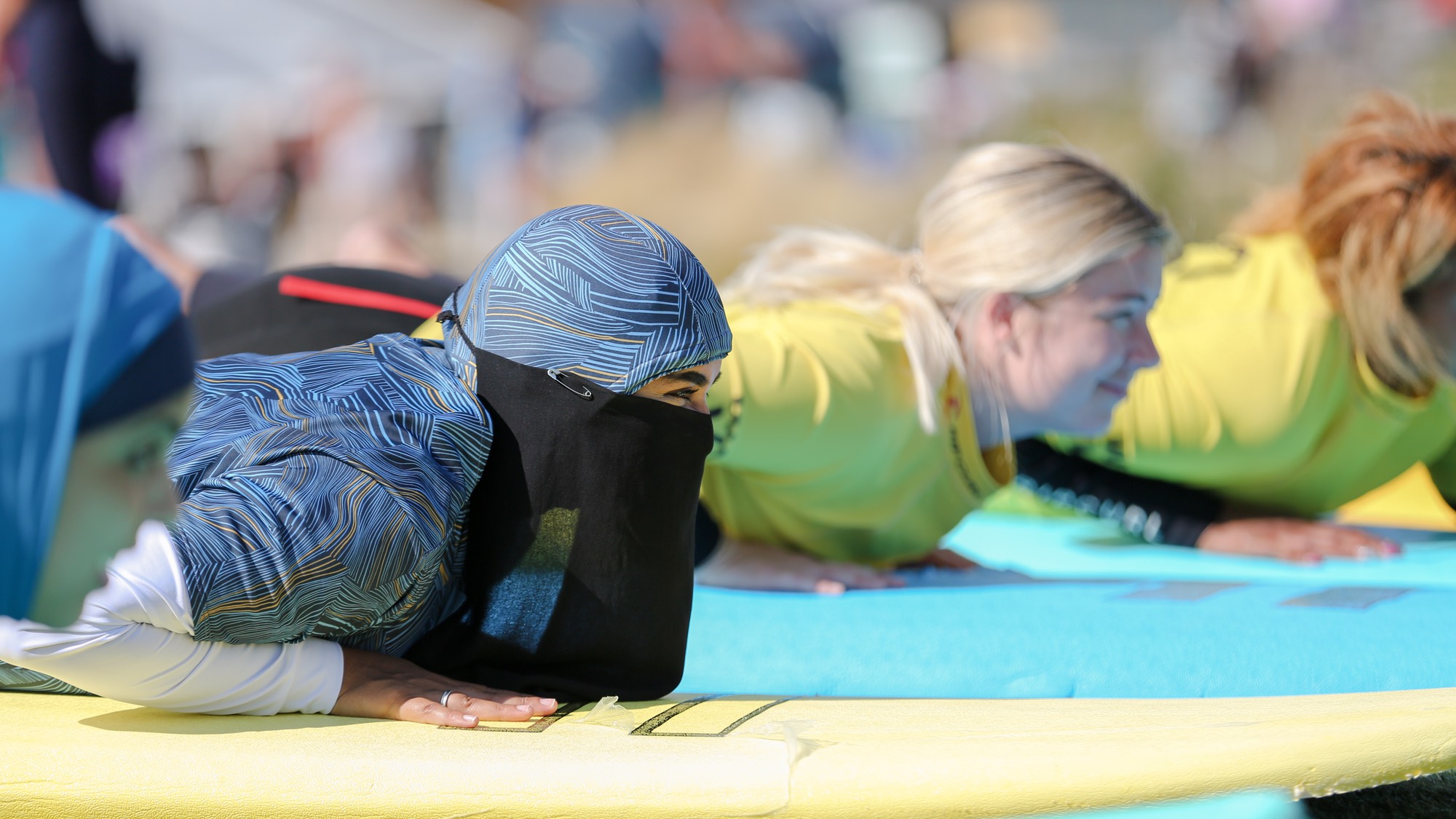
In women’s surfing, the media lens is generally trained on Steph’s latest title run or Erin Brooks doing some tweaked-out air in Waco. This is just the very tip of the women’s surfing pyramid. Beyond today’s pros there are legions of other women who simply want to feel comfortable in the surf – adult learners, desk jockeys, adaptive surfers, the economically and socially challenged as well as those whose religious beliefs prevent them from rocking up to the surf in a skin-tight wetsuit. And let’s be honest, many lineups around the world aren’t very welcoming. The patriarchy pretty much owns surfing, but wave pools are championed as the great equalizer of the sport.
Enter The Wave’s special women’s program and two surf coaches, Lucy Wheldon and Hannah Mattinson. They are helping provide women of all backgrounds with a safe, supportive environment in which to surf.
Lucy learned to surf at The Wave two years ago. Smitten, she landed a job in customer service to be close to the waves. Hannah has been at it a decade now, traveling the world with a lengthy stint in Brazil. Despite their different surf backgrounds their paths have crossed and landed them both coaching roles at The Wave. While the job title of surfing coach isn’t particularly unique at a wave pool, Lucy and Hannah’s students herald a fundamental shift in the surfing paradigm made possible by wave pools.
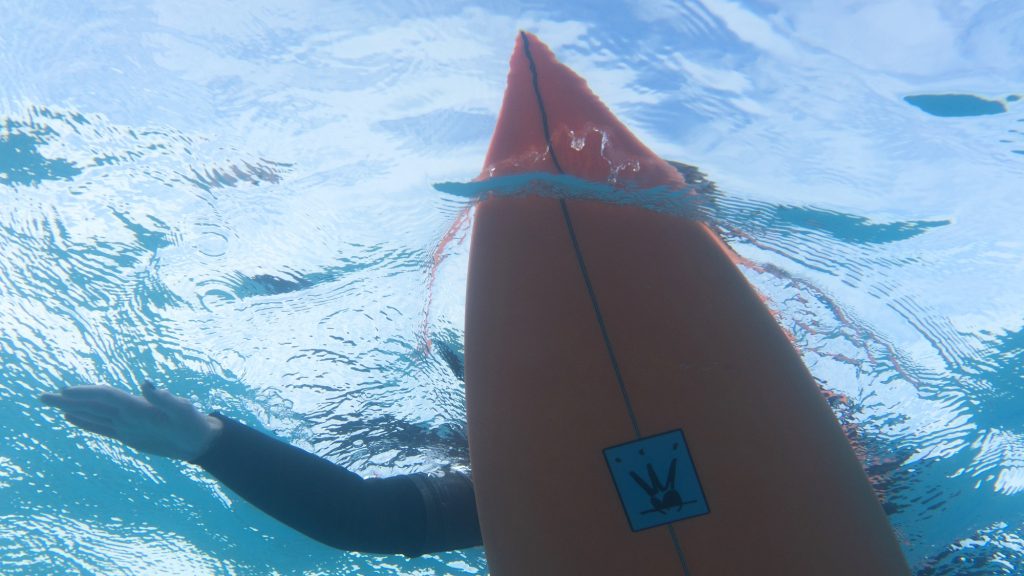
What’s your coaching focus at The Wave?
Lucy: Most of our lessons are mixed, so adults and children. And we teach them together in one group rather than separate.
Hannah: We also coach adaptive sessions. You might have people with physical or mental requirements that just need a bit more support or one-to-one that we both do quite a bit of. But we’ve got the Wave Project in the water after this. I do a lot with that. And women’s only sessions.
So so tell me about that. How does that work?
Lucy: Some of these ladies have been visiting quite a lot over the last six months or so. We recognize a few of them and they’ve become kind of familiar faces now and then they tend to bring along other people and get joined in with the group and have a try at surfing.
Hannah: It’s normally just a really lovely way for people to kind of try it out. A lot of the time some of them come from groups like Social Impact Group. So it might be women who’ve kind of had difficult things happen in life and so it’s combining surf therapy with just giving women the opportunity to try things without the barriers which for some people is religious reasons. For some people it’s just like a life experience reason, but sometimes it’s just a way for them to get involved without having that block of having men in charge. For some people it’s just preference. I’ve grown up with brothers or I’m just used to guys at the gym who kind of give me funny looks. I just want a space where it’s just women spotting women and for some it goes a bit further than that. It’s not like physically you can’t do this sport without men. The women who have religious restrictions, well, a women’s group opens the door. You know, there’s no real gatekeeping to it. It’s just if this is what’s right for you, get on it.
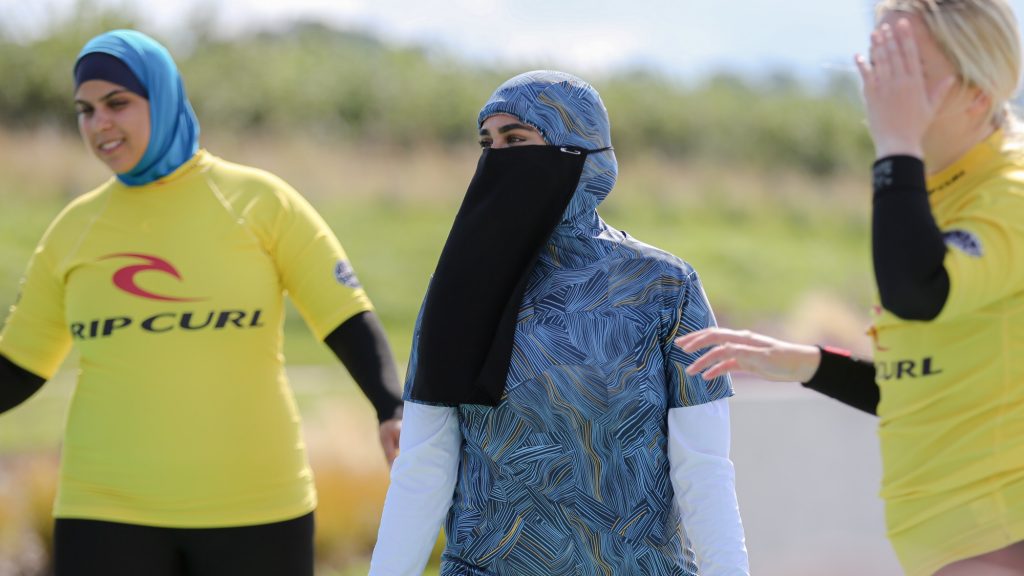
Lucy: From what they’ve said, some of those ladies who visit don’t want to be around men for religious reasons. They’ve also grown up in their culture not really being around water as well. It’s a whole new world for them in itself, just getting in the water because they haven’t necessarily had that opportunity to do that. A lot of them are quite scared of water initially as well. That’s a hurdle you have to sort of overcome as well as learning how to surf.
Hannah: The whole of surf culture, especially for women, is bikinis and the message is ‘the more flesh, the better.’ For this group we teach, for religious reasons or just preference reasons, they can’t be in a skintight wetsuit. There have been things like the invention of the sea suit, which kind of provides a bit more modesty for those women who want it. So we give people the chance to be like, ‘Hey, there’s always a way to surf if you want to start off.’
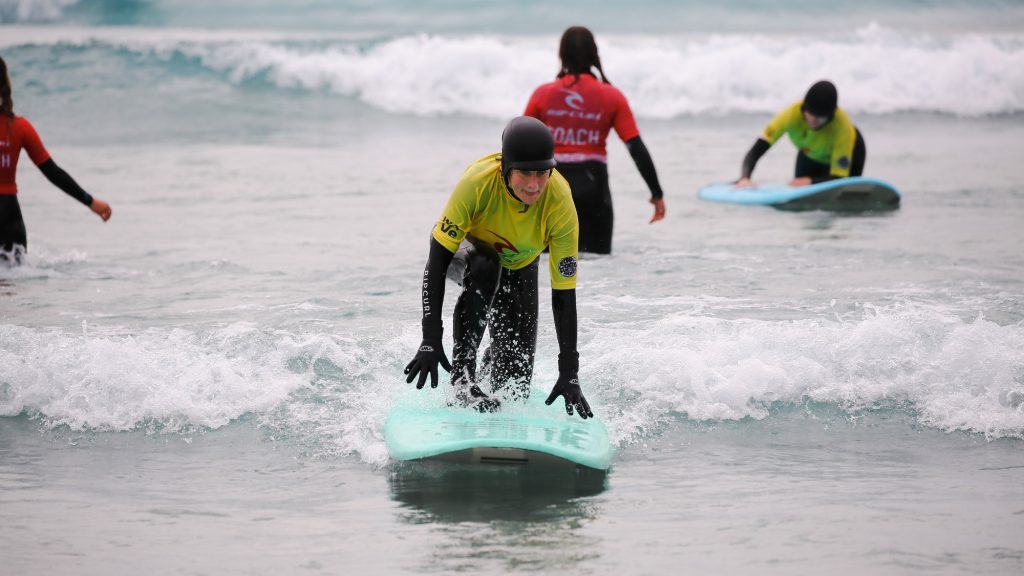
So as things evolve, where do you see women’s surfing changing?
Lucy: I think it already is evolving massively. I was teaching a lesson yesterday, an intermediate session, and I think it was one of the first sessions I’ve been in where it hasn’t been pre-arranged as a women-only session, but the number of women in the session outnumbered the men. And the women were vocally supporting women whom they hadn’t met before. And it was great. And just being able to chat to them about it.
Hannah: I know for me, definitely like starting surfing in the ocean, then coming to wave pools. Just the fact that here it’s so organized, there’s no need to kind of battle for lineup position. It’s so much more accessible than in the ocean. I’m not going to try to out-paddle this guy who’s twice my size and has this really kind of heavy charger attitude. It’s a cue. When it’s your turn, it’s your turn. There’s no pressure. It’s the same wave every time. It’s just making it more accessible. And then that confidence, you know, can hopefully then translate back into the ocean.
Lucy: There are so many more organisations around it now, like Women and Waves is a big one that I follow. They are encouraging groups of women to come out, learn to surf and progress at it. I think, I think it’s sort of evening out a little bit more now as well.
Hannah: The big thing I found doing the intermediate lessons is helping manage expectations. Coming from the ocean, there’s always that element of like, well, you’re not surfing the point or the slab, you’re only surfing the main sand bank. Whereas here at The Wave, you enjoy your surf. Intermediate session on a nine-foot board and you kill it every time and that’s that! The ego gets taken out of it quite nicely here because it’s just an even playing field and you take it as far as you want and each level is just as good as the next.
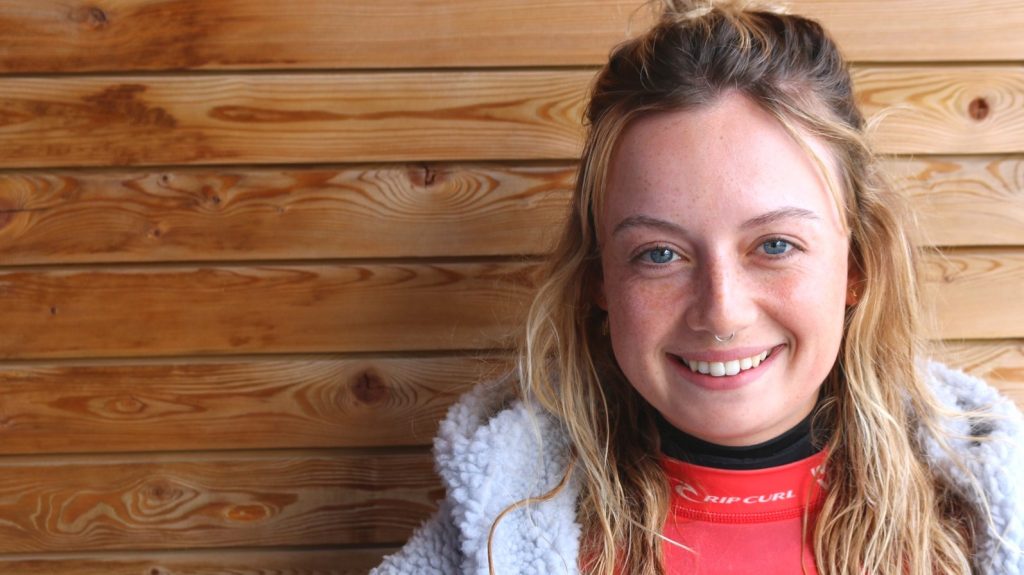
Has anyone said anything that really stood out to you and, well, just made you happy?
Lucy: I guess we get a lot of immediate feedback after our women’s only session with people saying they loved it and they felt really confident and comfortable within it.
Hannah: I think honestly, from the staff perspective, obviously there’s been a big push this season for more female coaches, so me and Lucy are only a fraction of the female coaches we have here. We’ve got two girls who’ve just gone back to uni and two that also work in surf ops. I found out by talking to a lot of the girls that we all kind of help each other out. There’s that freedom to be okay with sucking for a while. I’ve never felt comfortable having a session where I just wipe out for an hour because it’s like, even when we’re doing that, you’ve kind of got each other’s back. I had one of those last week, but then yesterday I saw Lucy nail her cutbacks. We had a lady on our women’s only surf this morning who stood up for the first time and she was in tears. I mean, afterward because she said ‘I didn’t ever see this happening. I was going to try it out, but I didn’t actually realize how it would feel and to get here and for the first time get to my feet was incredible.’ And all the women were cheering. And it felt very connected in a way that, you know, a lot of people associate that spirituality and that connectedness to the people around you and the ocean. But it’s like, I definitely think you can find it here, even though the wave is manmade. There’s a lot more of a community you can build up here.
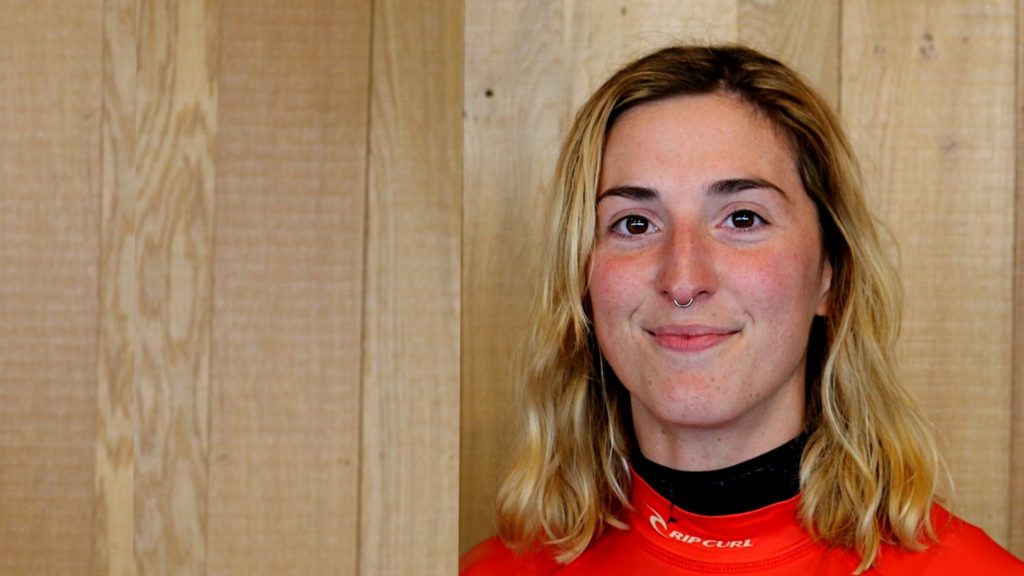
Do you think the women’s only surf experience is unique or better suited to a wave pool than it would be down to your local beach club?
Lucy: I guess it kind of lends itself to a little bit more to an organizational run, like it makes it easier. We have specific spots that we can release and reserve for women and have areas where we can meet quickly.
Hannah: And I think honestly, for me personally, that coming from the ocean I’d love to see it not be limited to a wave pool. So we had Carissa Moore’s dad come in, and just kind of have a chat with the coaches. They came to Europe on the tour and he made the point about how wave pools are an amazing tool for technique. But, you know, as a pro surfer, he’d be looking at making sure that was in tandem with oceans. You know, it’s like this is the training ground. And then you take it into the ocean. And I kind of would love to see what happens here with women-only programs. So it’s like this is the training ground for you to build those skills, build that confidence, learn how to be confident in your abilities in the water as a surfer then you can then go down to Newquay. Here is a training ground where women can kind of organically gain that confidence without all the pressures that come with the ocean where you’ve got localism, you’ve got that general fear of the unknown. Any time you go to a new spot you’re always checking the topography, looking for rocks and hazards. But here in a wave pool it just makes it lovely and accessible.
Related Coverage
